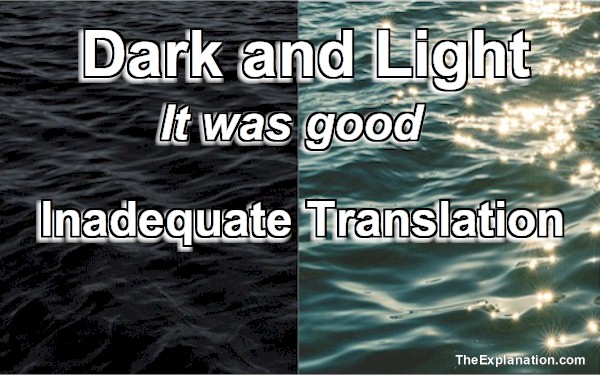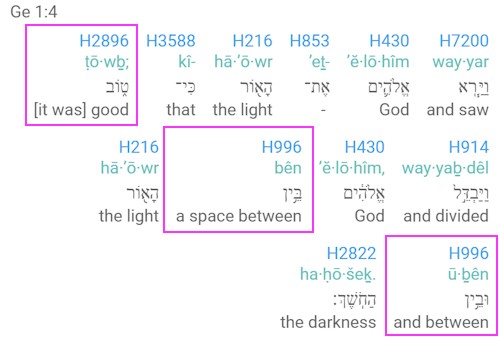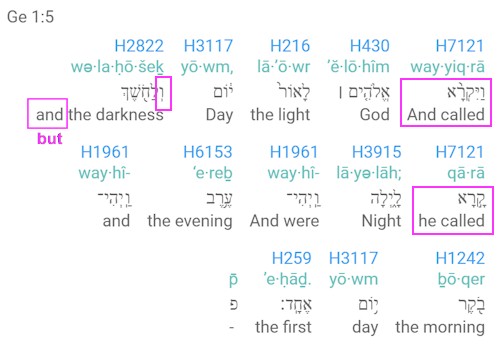“It was good” is what God stated after each of the first days of Creation; this is a gross understatement of the deeper meaning of the Biblical Hebrew.

It was good. Dark and light. These are inadequate translations that do not carry the message their Author intended. Find out what it is.
It was good summarizes, inadequately, the work God accomplished during each day of creation; this includes the need to make a much clearer barrier between dark and light, night and day. The Biblical Hebrew reveals what the English translation fails to do.
(Origin of the Universe, chapter 8.4)
We’re discussing the significance of God restoring light on the first day of creation week; this starts in verse 3 of Genesis 1. Before this, in verse 1, it says, “In the beginning God created (bara)…” But, during this 1st and until the 5th day, the verb bara—ex nihilo creation—is not used. We have discussed Big Bang at length, that was the original bara — the creation of time and space from God’s Spirit. Considering the chronology of these events, 13.8 billion years ago, and 4.5 billion for Earth, the absence of bara should not be surprising. Gen. 1.3 is not the original creation—Earth already exists—this is a REjuvenation of Earth’s environment, in preparation for humankind.
3. And God said, Let there be light: and there was light.
4. And God saw the light, that it was good (H2896): and God divided (H914) the light from the darkness.
5. And God called the light Day, and the darkness he called Night (H3915). And the evening and the morning were the first day.
God merely has to state what He wants for it to happen: “Let all the earth fear the Lord: let all the inhabitants of the world stand in awe of him. For he [God] spake, and it was done; he commanded, and it stood fast” (Psalms 33:8-9). Such a short verse for such an incredible accomplishment.
Please don’t ask me to explain how this works! I haven’t got a clue; this is one of those out-of-this-world phenomena that we can meditate for a long, long time. Either this is pure imagination on behalf of the author of Genesis, that we are to take figuratively. Or, this ability to bara and REjuvenate (as in Genesis 1-2) is solely a prerogative of God. It’s up to each one of us to decide based on our viewpoint and faith–yes, lots of faith. This kind of belief is not present today, the world does not stand in awe of God, as the above verse in Psalms says. Many who even refer to the Bible don’t believe those words.
However, we’re looking at Genesis through God’s eyes—in the spirit of true Theology, not human or personal theology; this means we take it as God’s word. So, planet Earth was already present in Genesis 1:3. It was immersed in water and vapor that covered devastated Earth—the whole planet was in a state of tohu and bohu. I don’t know what astronomic and cosmological phenomena happenings brought about this dark to light. But, God spoke, and this new dark/light, night/day configuration came into effect. It was good.
There is possibly a lot of laughing and jeering going on about such belief. But, let me ask you, the Sun’s emission of energy and light in just one second is incredibly superior to any fusion bomb humankind has invented. How do you explain that? I’m not talking about the chemical mixtures and scientific formulas that we measure so well. Beyond that, what is its origin? How did it get organized into dark/light, night/day? Nobody can explain this. We all have faith, just in different explanations at different levels.
the Sun's emission of energy and light in just one second is incredibly superior to any fusion bomb humankind has invented. How do you explain that? We all have faith in something. Just in different explanations. Click To TweetGalacti wonders: Why were God’s first words for ‘light’?
God’s entire plan is Light. If one word can summarize His master plan, this is it.
Understand that Genesis chapter 1 is a factual physical REconfiguration of Earth. But, it is also an expose of the reality of a spiritual REconfiguration. When Lucifer, who became bringer/bearer of dark, brought physical darkness on Earth, that ended a chapter in God’s plan, but that’s certainly not the end of the book. With these renewed rays of Light on Earth, another exciting chapter begins, and that chapter is the entirety of the Bible. Our story starts very strong, in the Light, and to give you a preview of the conclusion; it ends in the Light.
Sam, that’s some statement, Genesis chapter 1 is a factual physical REconfiguration of Earth. Someone will surely consider this as a fundamentalist, even a dangerous statement.
I see your point, and all I can say is I’m not trying to wear any hat. My intention is solely to explain what Genesis says. It’s up to each one to believe what they want to believe. I’ve written about Lucifer becoming the Serpent, Big Bang, including the formation of our planet Earth and the Bible, how and why Earth became tohu and bohu.
None of that is in any other literature. That’s why we discussed Sacred Books and focused on the Bible–-because it alone, at least, gives us a chance of answering all the why questions. The what, how, and why of humankind.
I consider Genesis 1:3 as merely the continuation of the Bible story of Lucifer, Big Bang, the original creation of Earth, and now it’s REconfiguration for humankind. At this point, I’m not discussing historical dates. But I will get into that in due time, and we’ll talk about dinosaurs, prehistoric man, and ancient cave art. Please be patient; there’s nothing dangerous here.
Remember, we’re assembling the puzzle pieces. Coherent completeness necessitates putting each piece in its proper place. That includes all the pieces–the real facts–that science, archaeology, psychology and all other studies have revealed. Science has facts, but it doesn’t have all the coherent answers: What is the origin of all the material in Big Bang? And to come down to Earth, what’s the source of all the water?
The Explanation intends to give you plausible answers to all these questions, not based on Sam’s conjectures. But on what the Biblical Hebrew in the Bible reveals. Whether what Sam exposes makes sense or not is your decision. That’s your free will.
As we ponder, we remember that to have light; you need a source of energy; you need a way to transmit those photons of life-giving light. Darkness in the sense we’re thinking of is synonymous with destruction, cold, blindness, being lost, groping around.
God is the opposite of darkness. It was good.
Where there’s darkness, God transforms it into light: “The people that walked in darkness have seen a great light: they that dwell in the land of the shadow of death, upon them has the light shined” (Isaiah 9:2). Our interactive Bible shows that this is the spiritual counterpart of Genesis 1:3. “For you are my lamp, O LORD: and the LORD will lighten my darkness” (2 Samuel 22:29). Look how this next verse corroborates Gen. 1:3 to show us God’s goal, “to open their eyes, and to turn them from darkness to light, and from the power of Satan to God…” (Acts 26:18).
That’s what He did precisely with the REstoration of Earth. Turning darkness into light is one of the recurring themes (see this ups-and-downs chart) of the Bible.
It was good – terrible understatement
God saw that the light was good (Genesis 1:4). This declaration is a gross understatement. Look at how this Biblical Hebrew word for it was good is translated elsewhere:
טוֹב ṭôwb tobe; from H2895 (טוֹב); good (as an adjective) in the widest sense; used likewise as a noun, both in the masculine and the feminine, the singular and the plural (good, a good or good thing, a good man or woman; the good, goods or good things, good men or women), also as an adverb (well):
KJV – beautiful, best, better, bountiful, cheerful, at ease, ⨯ fair (word), (be in) favour, fine, glad, good (deed, -lier, -liest, -ly, -ness, -s), graciously, joyful, kindly, kindness, liketh (best), loving, merry, ⨯ most, pleasant, + pleaseth, pleasure, precious, prosperity, ready, sweet, wealth, welfare, (be) well(-favoured).
Substitute each of the above King James translations for it was good in this verse: And God saw the light, that it was good. And God saw the light, that it was bountiful. And God saw the light, that it was precious. And God saw the light, that it was welfare. Again, realize what’s happening here. These are not Sam’s translations. These other King James Version translations for the identical Biblical Hebrew word throw a greatly magnified understanding of the nature of light.
I’m emphasizing the inadequacy of it was good in a day when we apply superlatives to all copywriting publicity, CVs, and just about everything: Magnificent, supreme, prodigious, maxi, super, ultra, mega. It was good doesn’t stand a chance anymore. When God saw the light, that it was good — that is the superlative of superlatives and should be rendered so.
Light and darkness divided – another understatement
Our reading habits and mainly our mind-associations cause us to attribute definitive meanings to certain words automatically. When we read: “God divided the light from the darkness” (Gen. 1:4), we are limited solely to a physical understanding. We skim the word divided along with some of the most common words in English like day, night, light, dark, evening, morning. We experience each of these words every 24 hours; they are such common phenomena that we give them a cursory glance and think nothing more of it.
Colossal error, but this is unavoidable in English. The Biblical Hebrew opens whole new vistas.
Galacti points out that the light is so beautiful and precious, it procures such prosperity and well-being that God divided it from the dark. Strong’s concordance gathers other KJV translations of the same Biblical Hebrew words (H914) revealing the more incisive nature of divided:
בָּדַל bâdal baw-dal’; a primitive root; to divide (in variation senses literally or figuratively, separate, distinguish, differ, select, etc.):
KJV – (make, put) difference, divide (asunder), (make) separate (self, -ation), sever (out), ⨯ utterly.
Here are a couple of contexts to reinforce the strength of what divided should mean to us.
25 You shall therefore put difference (H914) between clean beasts and unclean, and between unclean fowls and clean: and ye shall not make your souls abominable by beast, or by fowl, or by any manner of living thing that creepeth on the ground, which I have separated (H914) from you as unclean.
26 And you shall be holy to me: for I the Lord am holy, and have severed (H914) you from other people, that you should be mine.
Ezekiel 42:20
20 He measured it by the four sides: it had a wall round about, five hundred reeds long, and five hundred broad, to make a separation (H914) between the sanctuary and the profane place.
Dividing light from dark is not merely witnessing dawn and dusk with their smooth, calm, and often romantic transition. This division is to make a clear distinction that they have nothing in common; it is to show they are two very different and separate entities. As we understand in Ezekiel, above, there’s a literal barrier that separates darkness and light, the profane and saintly places.
We’ll get into more detail later, but what we see here is that this dividing means God doesn’t have a mixture of semi-darkness or semi-light or twilight. He has divided it into deep dark and bright light: complete opposites, there’s no in-between. We see this as the stage lights go dark and then come on again, more radiant than before.
Another differentiation is obscured by the English translation by omitting not once, but twice, a Biblical Hebrew word. This total separation is reinforced by the use of the Biblical Hebrew word בֵּ֥ין (ben H996) pronounced bain meaning between elsewhere, also translated asunder.

Genesis 1.4 Here, you can see the Biblical Hebrew word tov and especially ben signifying between used twice in the context.
The next verse in Genesis we hear, in Hebrew rather than in English, drives this opposition home: “And God called the light Day, and the darkness he called Night” (Gen 1:5). In the English translation, we have one past tense verb, called, for both nouns: Day, night. Our interactive study tells us this is not so in Hebrew; the first called is Wayyiqtol, the second Qatal, two distinct past tenses to impress on the reader the difference. Also, note in the first part, the verb ‘called’ precedes light, and in the last part, ‘called’ follows darkness. Poetically this is a chiastic arrangement to highlight the contrast of light and darkness. The term it was good also refers to the distinct separation.

Genesis 1:5. Different verb and sentence structures for called to signify the opposition between night and day. As well as the use of the conjunction but.
We get to the point that we can translate the central conjunction and with but to add further emphasis. We can now read this verse: “And God then called the light day, but the darkness He called night. The ‘then called the light’ is to note the use of wayyiqtol for contrast with ‘darkness He called‘ use of qatal. There’s no light in darkness and no darkness in light, there’s no God in the Serpent, and there’s no Serpent in God, there’s no tohu and bohu in God’s creation, and there’s no Godly creation in tohu and bohu.
This blog post is an excerpt from chapter 8.4 of the book Origin of the Universe
Further Study
Study of light and darkness
Go over to UnlockBibleMeaning.com and find all the verses with the same Hebrew word for ‘Light’ and draw a conclusion:
Look for corroborative contexts in the New Testament using the Search function to find light, day, dark, darkness, night. Here’s one to start you off: 1 Thessalonians 5:5 “You are all the children of light, and the children of the day: we are not of the night, nor of darkness.” Do you see the distinction, separation, even the opposition of day and night?
Good. Under the Strong’s reference for good (H2896), click on Hebrew Concordance for H2896 and read the verses with these alternate translations of good. As you know, it was good is the final description of God’s work on the third and also, it was good on the fourth creation days. Consider how good God’s entire work is. It was very good at the end of Day 6.
Check Genesis 1:4 “…and God divided (H914) the light from the darkness.” Or, “God divided (H914) between (H996) the light and between (H996) the darkness.” Look up H996 and see it for yourself.
בֵּין bêyn bane; (sometimes in the plural masculine or feminine); properly, the constructive form of an otherwise unused noun from H995 (בִּין); a distinction; but used only as a preposition, between (repeated before each noun, often with other particles); also as a conjunction, either…or:
KJV – among, asunder, at, between (-twixt…and), +from (the widest), ⨯ in, out of, whether (it be…or), within.
Notice the translation asunder, which I referred to in this blog post. A word with powerful meaning tearing apart.
For more information about the use of chiastic arrangements to show contrasting aspects, check this article. There, you’ll see this quote: The usage of both chiasmus and antimetabole can reinforce antithesis. In other words, to strengthen opposite settings, which is precisely the case of day and night, light and darkness.
Dig Deeper into The Explanation
Join The Explanation Newsletter to stay informed of updates. and future events. No obligations, total privacy, unsubscribe anytime, if you want.
Online Study Courses to Unlock Bible meaning via Biblical Hebrew… with no fuss. Free video courses that put you in the driver’s seat to navigate the Bible as never before. Join now
The Explanation series of seven books. Free to read online or purchase these valuable commentaries on Genesis 1-3 from your favorite book outlet. E-book and paperback formats are available. Use this link to see the details of each book and buy from your favorite store.
Since you read all the way to here… you liked it. Please use the Social Network links just below to share this information from The Explanation, It was good, is a Translation Fiasco of God’s Actual Creation Statement


Trackbacks/Pingbacks